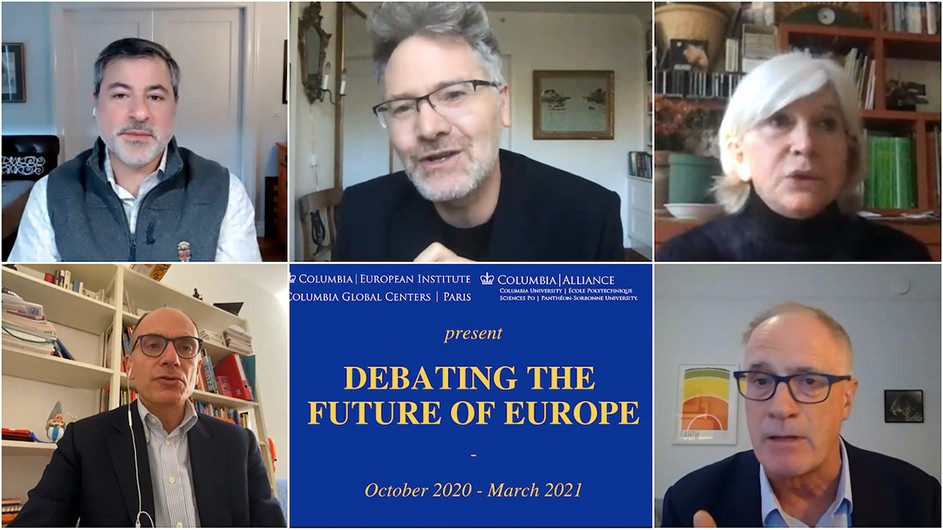Can the EU Lead the Fight Against Climate Change?
A trans-Atlantic dialogue on the European Green Deal, climate diplomacy, and the impact of youth activist movements on shaping public policy.

On December 15, Columbia Global Centers | Paris, the Alliance Program, and the European Institute hosted a conversation with Columbia climate leaders and European public policy experts. The discussion, moderated by European Institute director Adam Tooze, featured Jason Bordoff, founding director of SIPA Center on Energy Policy, and Alex Halliday, director of the Earth Institute and the Columbia Climate School. They were joined by Enrico Letta, former Italian prime minister and dean of the Paris School of International Affairs, and Laurence Tubiana, CEO of the European Climate Foundation and a key architect of the Paris Agreement.
The event was part of an ongoing bilingual series dedicated to the future of Europe. In his introduction, Alliance Program Director Emmanuel Kattan pointed out the timeliness of the discussion coming just days after the five-year anniversary of the Paris Agreement and on the heels of the University’s announcement of the launch of the first degree program at the Columbia Climate School.
Is Europe Leading on Climate, or Is Climate Leading Europe?
Reflecting on the effects of the political and economic challenges of 2020 on the first year of the European Green Deal, Letta commented, “We had a crucial moment during the spring that was, for me, a crossroads. There was a big risk of putting a priority on saving the economy, and maybe, climate change and the environment would be second. And I think it was a great choice made by the European Commission and the European Council to combine the two priorities to relaunch with the Green Deal.”
Both Letta and Tubiana noted that there was an enormous shift in public opinion toward a green transition since the signing of the Paris Agreement in 2015.
“Ecological transition in Europe is a factor of unity,” Tubiana said. “I think that politicians are beginning to understand that.”
The Biden Administration and Hope for Renewed Climate Diplomacy
“I think it is notable how big a role climate played in this election,” said Bordoff, who served as senior director for Energy and Climate Change at the National Security Council during the Obama administration. “If you see the President-elect’s transition website, climate change is centrally related to other priorities which are economic recovery, dealing with the pandemic, and racial justice.”
Bordoff continued, noting that he thought it was intentional that “President-elect Biden’s climate envoy was announced not as part of his environmental team, but as part of his national security team.”
Halliday was relieved that the Biden administration will be back at the negotiating table on climate, but remains pragmatic: “Both sides of the Atlantic have got to confront this massive issue that we face… Impact has to be achieved really fast in terms of changing industry, in changing the energy section, and in dealing with the disenfranchised communities that are suddenly going to be left behind because they work in the coal industry.”
Disenfranchised Communities: the Example of the Gilets Jaunes
According to Tubiana, the Gilets Jaunes, or Yellow Vests, movement and its demands for fair tax policies demonstrates how central the question of social justice is to an equitable ecological transformation, which cannot be implemented from the top down: “This is about social change, so if you don’t give citizens a voice–a capacity to decide at the local level and even at the national level–you can’t deliver this transformation, and you will have always the lobbies saying ‘we cannot do this now’.”
Bordoff agreed. “People who work on climate policy like us need to work more closely with people doing economic development and policy to think about what a more rigorous set of policies look like, because I’m afraid that, if we don’t take that seriously enough, those political barriers will actually make it harder to move more ambitiously on climate,” he said.
The event closed on an optimistic note with Letta emphasizing the continued positive influence of the youth climate movement in creating a major shift in public opinion and real political change.
Halliday concluded, “I do feel tremendously excited about the European Green Deal,” adding that “there’s cause for optimism now that America will be returning to the table,” and that people are recognizing that there are opportunities “in the future in terms of new jobs and industries going forward.”
This event was the third session in the Debating the Future of Europe series, which features scholars from Columbia and prominent writers, intellectuals, and journalists from the European Union. This bilingual series also includes French-language interviews of European thought-leaders by Thierry Grillet, former cultural director of the Bibliothèque Nationale de France. Listen to his interviews on climate change with physicist Sébastien Balibar and glaciologist Jean Jouzel. Videos of the conversations are available on the Columbia Global Centers | Paris website and YouTube channel.